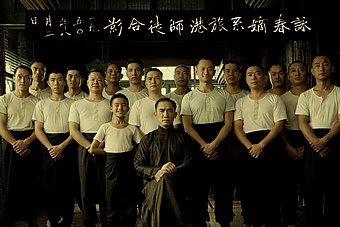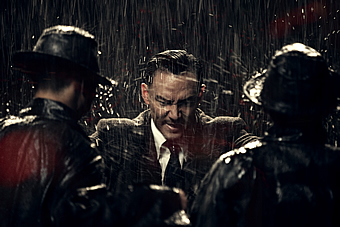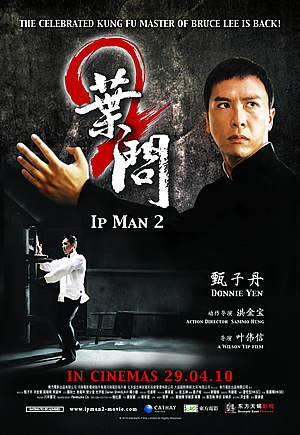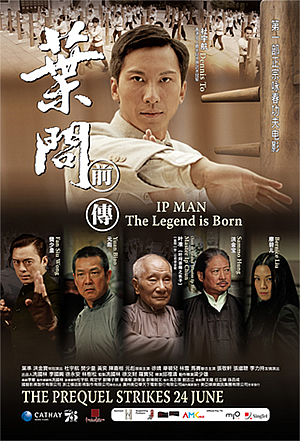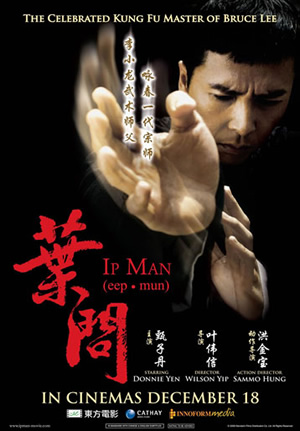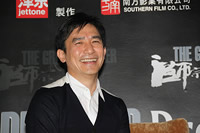THE GRANDMASTER (一代宗师) (2013)
Genre: Martial-Arts
Director: Wong Kar Wai
Cast: Tony Leung, Zhang Ziyi, Chang Chen, Song Hye-Gyo, Zhang Jin, Zhao Benshan, Cung Le, Wang Qinxiang, Xiao Shenyang, Lo Hoi Pang, Yuen Wo Ping, Lau Shun, Shang Tielong, Lo Meng, Julien Cheung
RunTime: 2 hrs 5 mins
Rating: PG13 (Some Coarse Language)
Released By: Shaw
Official Website:
Opening Day: 31 January 2013
Synopsis: It starts as the story of Ip Man. He was born and raised in Foshan. From the time of his youth he took part in contest after contest of skill in and around the Gold Pavilion. Then, one day, Master Gong arrived from the Northeast to hold a retirement ceremony at the Gold Pavilion. One retires, one steps forward. But who is entitled to be called a grandmaster? Ip Man? Master Gong’s daughter, Gong Er? The self-described ‘rascal’ of the Northeast? Or is it Master Gong, who took the Northern martial arts to the South? Some are looking to recover what belongs to them. Others want to achieve enlightenment. Then there are those who are only ever able to start fires and light lamps, and those who observe the currents of a chaotic and war-torn world from the sidelines. Kungfu, a horizontal and a vertical, falling, rising, charging forward, carrying on. An era, rising and falling, scattering, regrouping, counter-attacking, advancing. It starts in Foshan. Its heart is in Dongbei. Its feet are on the ground in Hong Kong. This can no longer just the story of Ip Man.
Movie Review:
“Don’t tell me how good your skills are, how brilliant your master is and how profound your school is. Kung fu - two words - one horizontal, one vertical. If you’re wrong, you’ll be left lying down. If you’re right, you’re left standing. And only the ones who are standing have the right to talk.”
Those opening words from Tony Leung’s Ip Man could very well express what Wong Kar Wai might have felt in the midst of making his long-gestating ‘The Grandmaster’, which was once titled ‘The Grandmasters’ before the plural form was substituted for its singular.
For all intents and purposes, the film began as a biopic of one man – to be more specific, Ip Man, the influential kung-fu master who was instrumental in spreading the Wing Chun style around the world and who was perhaps better known for being Bruce Lee’s master. But in the midst of exploring Ip Man’s life, Wong must have been suddenly struck by the thought - What exactly makes Ip Man so special? Or even better, why should a movie set in the golden age of martial arts be solely about one grandmaster? What exactly makes one a grandmaster of kung fu?
And so, despite Leung’s omniscient voiceover recounting Ip Man’s life from his birth in Foshan to his death in Hong Kong, ‘The Grandmaster’ is in fact not about Ip Man alone. Rather, Wong has fashioned his movie as a meditation on the rise and fall of a unique group of individuals whose legacy was written as much by their own individual martial arts prowess as well as that of their next-generation disciples. Be warned therefore, if you are expecting a movie focused on Ip Man, because you’re likely to be sorely disappointed – as Tony Leung reportedly is – that you’re likely to know more about the Man from the Donnie Yen films.
Indeed, the narrative is the film’s biggest handicap, though to be fair, it only becomes apparent later on. The first half-hour begins strongly with a rightful focus on Ip, and key highlights include his initiation into martial arts by his master Chen Heshun (played by Yuen Woo-Ping) and his loving marriage to Zhang Yongcheng (Korean actress Song Hye-kyo). Ip’s first challenge would come with the arrival of Gong Yutian (Wang Qingxiang), a venerable kung fu master from northeastern China looking to consolidate his power in the southeast even as he retires.
After Ip goes on to win the battle of minds with Gong, the latter’s daughter Gong Er (Zhang Ziyi) stands up to challenge Ip yet again in a bid to restore her family’s reputation. That duel also marks a turning point for the movie, which shifts away from Ip and explores the vendetta that ensues between Gong Er and her father’s power-hungry protégé Ma San (Zhang Jin) against the backdrop of the Japanese occupation of China in the late 1930s and early 1940s.
Against the better advice of her elders, she forsakes her betrothal to avenge the death of her father at Ma San’s hands, which culminates in a thrilling battle set at an old railway station in Hong Kong one New Year’s Eve. Where is Ip Man’s involvement in all this? Admittedly there is little – and while the film casts the Japanese occupation as the darkest period of his life, the treatment of his personal ordeal is given short shrift and only cursory mention that it costs him the life of his two daughters.
Another casualty of Wong’s almost singular focus on Gong Er in the mid-section of the film is Chang Chen’s Razor, whom we are first introduced to as the stranger Gong Er shields from a search party on a train. One might think there could be some possible romance between Razor and Gong Er, but there is none – and besides the fact that Razor eventually moves to Hong Kong as well to start his own martial arts school in a barbershop, there is little further relation to either Gong Er or for that matter Ip Man.
Though Wong does bring Ip back into the picture towards the end of the film, his audience is likely to have grown too emotionally detached from the character. A scene towards the end that portrays supposedly the last time Ip met Gong Er is infused with the director’s signature sense of longing and regret as the latter reveals her feelings for the former, but how that bears relevance to what Wong is trying to say about Ip or Gong Er’s tumultuous lives is too obscure.
In fact, throughout the film, Wong offers little insight into the person of Ip Man. What might have been a meaningful portrait of his relationship with Yongcheng is lost when the latter is practically forgotten in the second half of the movie and whose subsequent passing is given just a passing mention. We learn little too of Ip’s relocation to Hong Kong, and how he built up his reputable school for Wing Chun that would go on to become a enduring symbol of his legacy till today. All things considered, a more coherent portrait of Gong Er actually emerges from the movie.
Rather than regard it as a Ip Man biopic therefore – which would undoubtedly bring in mind its unfocused narrative – you’ll be better off seeing it as Wong’s philosophical musings on martial artists. Fans of the auteur will recognise these familiar themes from his previous works, but Wong’s treatment is still unparalleled in conveying regret, longing, and unspoken desires – whether is it Ip Man and Gong Er’s mutual affection for each other, or Gong Er’s lament for a life less fully lived – with compliments from Philippe Le Sourd’s beautiful cinematography and Japanese composer Shigeru Umebayashi’s evocative score.
Le Sourd’s visuals are also particularly ravishing in the action sequences, designed with much imagination and flair by veteran choreographer Yuen Woo-Ping. The opening sequence (seen briefly in the trailer) that sees Ip Man take on a whole gang of men along a rain-soaked street (reminiscent of ‘The Matrix’ trilogy) is filmed with utmost clarity on the beauty and precision of the moves, with the subsequent duels between Ip Man and Gong Yutian as well as Gong Er set in an opulently designed brothel called the Golden Pavilion equally breathtaking to behold.
Keenly aware of the actors’ limitations, Yuen goes for elegance over spectacle, so while none of the sequences here will leave you gasping with adrenaline like the iconic one-against-ten duel in Donnie Yen’s ‘Ip Man’ or even the Donnie Yen-Sammo Hung tabletop faceoff in ‘Ip Man 2’, they are shot with poise and style befitting of a Wong Kar Wai film. Both Tony Leung and Zhang Ziyi also perform impressively given their lack of a martial arts background, the months of training to get them prepared physically for their respective roles paying off in the grace and confidence by which they execute their moves.
Nonetheless, Zhang easily trounces Leung in the film’s dramatic scenes, the former’s combination of grit and vulnerability making Gong Er a more compelling figure than Ip Man. The fault of course isn’t Leung’s alone, as his usual penchant for nuance and understatement unfortunately working against his portrayal in a narrative that pretty much relegates his character’s account as a marker of the passage of time. The rest of the actors are also pretty much sidelined - especially Chang Chen, who gets a total of three scenes and no more than ten minutes of screen time.
Of course, narrative was never a strong suite in Wong’s films, which typically were mood pieces boosted by his signature artistic flourishes. These trademarks are still very much alive in ‘The Grandmaster’, which is easily one of the most beautiful kung fu movies ever made. But plot plays a much more important role here than in Wong’s other films, since it is ultimately through Ip Man’s experiences in life that we come to understand his deeper introspections. This is where Wong’s film stumbles, relegating Ip Man to a sideshow instead of placing him front and centre – and given all that hype and expectation of Wong’s Ip Man biopic, the cut we see here (reportedly trimmed down from over twice its length) can only be regarded as a disappointment.
Movie Rating:




(Wong Kar Wai’s signature themes of longing and regret as well as his artistic flourishes are still very much alive, but ‘The Grandmaster’ squanders the opportunity of a more compelling exploration of Ip Man’s life with an unfocused narrative)
Review by Gabriel Chong
You might also like:
(Final).jpg)
Movie Stills
